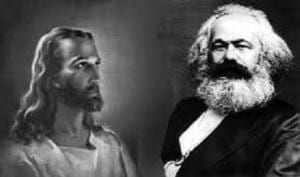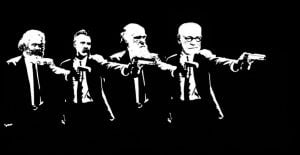I viewed Martin Doblmeier’s documentary about Dorothy Day, “Revolution of the Heart,” a few days ago. Doblmeier is a graduate of Providence College where I have taught for the past twenty-five years. I use Doblmeier’s documentary on Dietrich Bonhoeffer in class every time I team-teach “Grace, Truth, and Freedom in the Nazi Era” (fourth time this coming spring).
Dorothy Day was a radical Catholic Christian. She understood that anarchism, communism, and Christianity have far more in common than many would like to admit. Seeing Doblmeier’s documentary reminded me of one of my own essays about Karl Marx and Jesus from a couple of years ago . . . a post that is in the top five all-time most popular on this blog. Enjoy!
We should read the New Testament as saying that how we treat each other on earth matters a great deal more than the outcome of debate concerning the existence or nature of another world. Richard Rorty, “Failed Prophecies, Glorious Hopes”
One of the many things I enjoy about teaching philosophy is that I regularly get to engage with students in studying the texts of thinkers labelled as “dangerous” or worse by various authority figures in my youth. Darwin . . . Freud . . . Nietzsche . . . Marx . . . these were some of the influential thinkers that good Christians needed to stay away and be protected from, recent Western civilization’s version of the Four Horsemen of the Apocalypse.
At least three of the four admitted to being atheists, and the fourth (Darwin) was an agnostic by the time he died. I doubt anyone in my youth who warned against the diabolical and anti-Christian energies of these authors had much (or any) first-hand familiarity with the texts in question, but one thing was certain—no God-fearing person would read, or allow her or his children to read, such disruptive and destructive filth. It’s almost enough to make one want to home school their kids.
A couple of semesters ago, I got to engage with all four of these worrisome guys in class. Nietzsche and Freud made appearances in my General Ethics class, we spent two weeks with Darwin in my “Beauty and Violence” colloquium, and Karl Marx showed up in my American Philosophy course.
How did Marx get into that class? Because of a fascinating article by Richard Rorty, one of the late twentieth- and early twenty-first century’s most influential and controversial American philosophers and public intellectuals (another atheist, btw). Rorty dominates the last few weeks of the course; one of my favorite of his essays is “Failed Prophecies, Glorious Hopes.”
Rorty’s essay is focused on a comparison of two highly influential texts that don’t usually go together: the New Testament and The Communist Manifesto. But the juxtaposition is not as strange as it might seem. Rorty suggests that
We should read both as inspirational documents, appeals to what Lincoln called the “better angels of our nature,” rather than as accurate accounts of human history or of human decency.
So imagine that Jesus and Karl Marx walk into a bar together—what would their conversation be like? Let’s get past the obvious jokes (“Jesus and Karl walk into a bar, which happens to be out of Karl’s favorite red wine. Jesus gets a glass of water and makes him some.”) and listen in.
- Jesus: Did you really write that religion is the opiate of the masses?
- Karl: Yeah . . . you got a problem with that?
- Jesus: No. I wish I had said it first.
- Karl: What ever happened to your prediction that you were going to come back, the Second Coming and all that?
- Jesus: What ever happened to your prediction of the breakdown of capitalism and the rise of an enlightened proletariat?
As Rorty points out, the “failed prophecies” parts of both of these texts are pretty embarrassing; the failures of either text to transform humanity are downright tragic.
We have been waiting a long time for Christians to behave better than pagans . . . We have waited a long time for regimes calling themselves “Marxist” to explain to us exactly what these new ideals look like, and how they are to be realized in practice . . . Many millions of people were enslaved, tortured or starved to death by sincere, morally earnest people who recited passages from one or the other text in order to justify their deeds . . . Most of us can no longer take either Christian or Marxist postponements and reassurances seriously.
But Jesus and Karl share a lot more in common than unfulfilled prophecies and misguided followers.
- Jesus: The problem with followers is that in short order they lose sight of what really matters.
- Karl: You’ve got that right—I wonder if the people claiming to be my followers ever actually read my book.
- Jesus: The percentage of your “followers” who have studied your book carefully is probably about the same as the percentage of my “followers” who’ve read mine carefully.
- Karl: Your core message and mine are actually very similar. I read this the other day: “We should find inspiration and encouragement in the New Testament and the Manifesto. For both documents are expressions of the same hope: that some day we shall be willing and able to treat the needs of all human beings with the same respect and consideration with which we treat the needs of those closest to us, those whom we love.”
- Jesus: I like that! Who wrote it?
- Karl: A guy named Richard Rorty. Why didn’t you know that? I thought you knew everything!
- Jesus: Hey, I’m human! Wasn’t Rorty an atheist?
- Karl: Yeah—you got a problem with that?
- Jesus: Not at all—I like atheists. A lot less bullshit to cut through.
Once one gets past the failed predictions and the misguided actions of less-than-perfect followers, Rorty says, both the New Testament and The Communist Manifesto are hopeful texts–embodiments of our greatest aspirations and dreams.
When reading the texts themselves, we should skip lightly past the predictions, and concentrate on the expressions of hope . . . There is a difference between knowledge and hope. Hope often takes the form of false prediction, as it did in both documents. But hope for social justice is nevertheless the only basis for a worthwhile human life.
Marx believed that religion is an opiate because its promise of a better life after one dies dulls a person’s senses to what needs to be done now in order to make our lives better and our societies more just in this world. But the message of the gospels can be read in the same way—the Sermon on the Mount is about this world, not one in a prophesied future.
At the end of his essay, Rorty fuses the two texts into a call that might strike some as . . . well . . . radical.
“Christian Socialism” is a pleonastic [I had to look that word up]: nowadays you cannot hope for the fraternity which the Gospels preach without hoping that democratic governments will redistribute money and opportunity in a way that the market never will. There is no way to take the New Testament seriously as a moral imperative, rather than as a prophecy, without taking the need for such redistribution equally seriously.
Those, of course, are fighting words for many who call themselves followers of Jesus. But they can be summarily dismissed only if the inspiration for one’s Christian faith is cherry picked from parts of the New Testament that leave out vast portions of what Jesus reportedly said as well as descriptions of how the early Christian communities organized themselves economically. Jesus and Karl have a lot in common—I wonder who is picking up the tab.
Parents and teachers should encourage young people to read both books. The young will be morally better for having done so.














